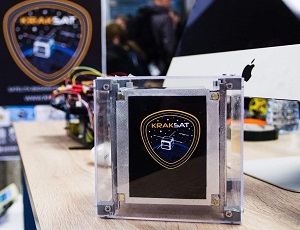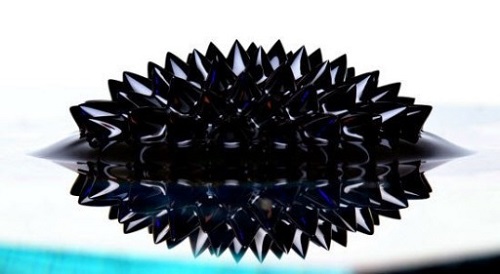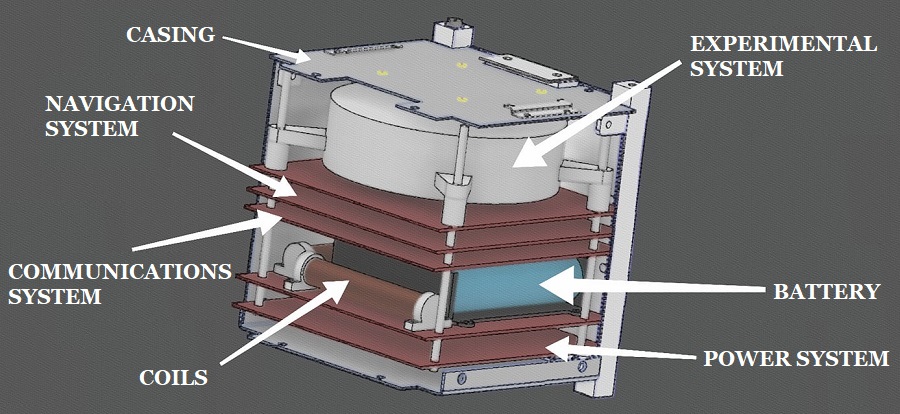
On Wednesday, 3 July 2019, a satellite constructed by students from two Kraków higher education institutions, AGH University of Science and Technology and the Jagiellonian University, in collaboration with Wrocław-based company SatRevolution, was launched into orbit. What is its purpose and how can we benefit from it in the future?
KRAKsat is quite a small device. It’s a cube with 10 centimetre long walls, no heavier than an ordinary carton of milk. Satellites such as this one are collectively known as CubeSats and are always launched as secondary payload (i.e. as additional cargo in rockets or together with supplies for the International Space Station). KRAKsat’s mission is to investigate how a ferrofluid will behave in space and whether it might be used in the space industry as a flywheel. If it sounds a little complicated, don’t worry and read on!
Spiky water
 To understand the idea behind the experiment, we first need to look at smart magnetic fluids, most commonly called ferrofluids. How do they differ from ordinary liquids in standard temperature and pressure? As the name suggests, they’re magnetised. To magnetise a fluid, we have to introduce microscopic (10 nm) particles of magnetite, a mineral with strong magnetic properties, into water or an organic solvent. To maintain sufficient dispersion of these particles in a ferrofluid, auxiliary compounds (known as surfactants, short for surface-active agents) are then introduced into the liquid. Therefore, ferrofluids are colloidal suspensions – a kind of ‘mix’ of two substances in different states. When a ferrofluid is exposed to a strong magnetic field, the magnetite particles move, causing it to become polarised and altering its shape and volume (pictured).
To understand the idea behind the experiment, we first need to look at smart magnetic fluids, most commonly called ferrofluids. How do they differ from ordinary liquids in standard temperature and pressure? As the name suggests, they’re magnetised. To magnetise a fluid, we have to introduce microscopic (10 nm) particles of magnetite, a mineral with strong magnetic properties, into water or an organic solvent. To maintain sufficient dispersion of these particles in a ferrofluid, auxiliary compounds (known as surfactants, short for surface-active agents) are then introduced into the liquid. Therefore, ferrofluids are colloidal suspensions – a kind of ‘mix’ of two substances in different states. When a ferrofluid is exposed to a strong magnetic field, the magnetite particles move, causing it to become polarised and altering its shape and volume (pictured).
Magnetic doughnut
The aim of the students was to use the ferrofluid as a flywheel. To that end, they constructed a torus (an empty tube resembling a ring doughnut), surrounded it by eight electromagnets, and placed a ferrofluid inside. By making changes to the magnetic field, they accelerated the fluid, causing a spinning motion that resulted in the rotation of the satellite in the opposite direction. Sounds simple, but in reality, it required meticulous planning and execution. It was necessary to select the right construction materials, provide suitable sensors and adequate programming, design a proper system to control the electromagnets, and then put it all together to create a working device. It also had to be durable enough to survive in harsh environment.
But why all this fuss? Up until now, all nanosatellites (i.e. satellites weighing between 1 and 10 kilograms) contained mechanical flywheels. KRAKsat was meant to test if the method of propulsion designed by Kraków students can be a successful way of stabilising satellites and controlling their position on Earth’s orbit. Aside from being innovative, the ferrofluid-based system is cheaper, simpler, and more reliable than mechanical ones, which makes it highly competitive on the market and may revolutionise space industry.
On 17 April, rocket Antares 230 was successfully launched from Wallops Flight Facility with KRAKsat on board, along with other nanosatellites and supplies. It docked at the International Space Station two days later with Cygnus spaceship. On 3 July, KRAKsat finally began its mission. Currently, it revolves around Earth at the height of approximately 400 kilometres.

Original text: www.nauka.uj.edu.pl
Pictures: KRAKsat website





